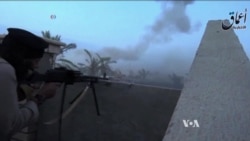The Islamic State group seized the last government-held border crossing to Iraq early Friday, the latest in a series of terrotorial gains for the terror group, and there are mounting fears the group could soon launch an assault on the Iraqi capital of Baghdad.
Now in full control of the Syrian city of Palmyra, Islamic State fighters tear down pro-government banners and portraits of President Bashar al-Assad from the walls of a gas facility on the outskirts of town.
There are fears that their next target will be the spectacular ruins of the ancient city. The conquering of Palmyra was a victory for Islamic State militants' battlefield strategy, said Sajjan Gohel, International Security Director at the Asia Pacific Foundation.
“They realize very quickly where they may be losing ground, like in Kobani, and then they relocate to a different part of Iraq or Syria to plot and plan a new attempt to take a city or town," Gohel said.
Kurds, airstrikes
The Islamic State group was driven out of Kobani in January by Kurdish forces, backed by coalition airstrikes. There was hope that defeat would be a turning point.
But three months later, the terror group is celebrating twin victories – Palmyra, and the capture of Ramadi in Iraq – just 120 kilometers from the capital Baghdad.
“Losing Ramadi was huge. It was a strategic loss. And the next step for ISIS at some point will be an assault on Baghdad. They may not succeed, but the point is the objective is to target Baghdad, and that is something the West has to keep in mind," Gohel said.
The West – led by the United States – is supporting coalition airstrikes on Islamic State positions in Iraq and Syria. Washington said this week that strategy is being stepped up.
“Our aircraft are in the air searching for ISIL targets, and they will continue to do so until Ramadi is retaken," U.S. State Department spokesman Jeff Rathke said.
But airstrikes alone will not halt the group's advance, argues Afzal Ashraf of the Royal United Services Institute.
“They have an impact which only lasts a short time. Unless you can exploit that impact on the ground, then you really lose the advantage. And they’ve been learning how to avoid airstrikes," Ashraf said.
Lack of coherent strategy
He argued the lack of a coherent strategy means Islamic State militants are still able to recruit fighters from across the region and beyond.
“Every time they make gains, more people wish to join them. Of course, measures put in place in Europe and elsewhere to restrict the flows have had an impact. But there are still many people who succeed in going to join them," Ashraf said.
The Islamic State group is different from previous Islamist terror groups like al-Qaida – and that is at the root of its resilience, Gohel said.
“This is not just a terrorist outfit. It’s a criminal enterprise. It’s effectively operating as a militia. They have resources on the ground, they have troop numbers, and they have the ability to fund their activities," he said. "Unless you have effective ground troop operations against ISIS, they will continue to spread their tentacles across Iraq and Syria, and worryingly even beyond that.”
From Pakistan to Nigeria, terror groups have adopted the Islamic State brand. Analysts said that with each victory on the battlefield, the group’s propaganda grows stronger.





